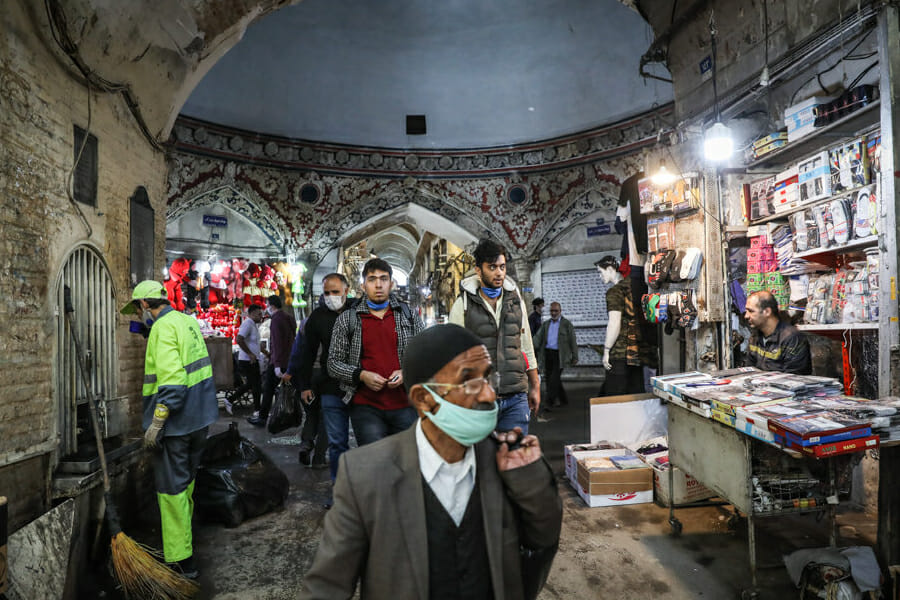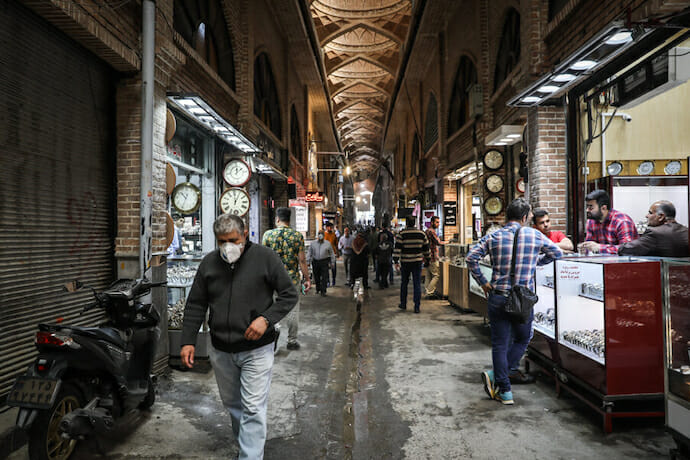
Will COVID-19 Shift the Power Balance in the Middle East?
The coronavirus, relentlessly spreading and rampaging across the globe, will have an enormous impact on the Middle East. The region already finds itself embroiled in multiple problems ranging from a series of interstate conflicts, sectarian violence, economic crises, refugee problems, and widespread political unrest. The consequences of coronavirus will add another layer of complexity to the frequent chaos.
The latest figures of COVID-19 have already reached more than 1,00,000 confirmed cases, with over 6,500 deaths in the region. Many of the health facilities in the region are not ready to cope with a large influx of patients as domestic problems continue to affect the operations of the healthcare systems, such as war (in case of Syria and Yemen), bankruptcy (Lebanon and Iran) or political instability (Iraq). As healthcare, government, and economic systems find themselves crumbling, a reorientation of Middle East power balances is inevitable. Countries that sustain their structures despite adversity will reshape the region’s geopolitics. Which countries are able to master the craft of survival remains in question.
The pandemic will drastically impact economies across the globe, but the effect on the Middle East will be unique. The GDP of the region, which stands at $3.5 trillion, is expected to decline significantly in 2020. This figure could be higher if the compounding effect of low oil prices and the slowdown of economies due to the closure of various public institutions and private sector enterprises do not get the required stimulus from their respective governments.
The COVID-19 crisis has led to a significant decline in oil prices which has cost the region nearly $11 billion in net oil revenues between January and mid-March 2020. During this time, the region’s businesses have lost a massive $420 billion of market capital, i.e., about 8 percent of the total market capitalization in the region. On the other hand, tourism sectors, a major contributor to the economy in countries like Egypt, Iran, Turkey, Palestine, and Israel, are also predicting a significant loss.
Key job-rich sectors in the region continue to suffer from the effects of the pandemic. Tourist cancellations have reached 80 percent in many of the countries, adversely affecting the retail and hospitality sectors. As the pandemic ravages businesses, the crisis could cause job losses for more than 1.7 million people in the region at an alarming pace, fostering an unemployment spike. With a large number of people employed in the service sector, including that of hospitality and retail, fears of an increase in unemployment due to layoffs are strong. This situation is particularly perilous for low-income migrant labourers — often coming from South Asian countries — who could be left impoverished without any governmental support regardless of charities stepping in as temporary assistance.
The amount of money sent home by migrant workers reaches as high as $70 to $75 billion. These finances from abroad form a major part of the economy in various South Asian and Southeast Asian countries. The financial linkage between the Middle East and South Asia via migrant labourers demonstrates how impediments on the Middle East economy will extend globally.

According to the International Monetary Fund (IMF), the economic outlook for the Gulf States this year looks bleak. The GCC is expected to post deficits in 2020 and will possibly slide into recession. The fiscal deficits of the GCC are projected to reach 10-12 percent of GDP in 2020, implying the need for additional financial stimulus of around $150 to $170 billion.
Unless the GCC governments intervene, the crisis will lead to the collapse of small and medium enterprises (SMEs) in the region- enterprises which constitute a critical component of the countries’ economic futures. Saudi Arabia and the UAE have started following the Chinese model of organizing stimulus packages for their SMEs. But, many countries with weak economies like Egypt, Jordan, and Lebanon have much difficulty in providing these businesses with the support they need to weather the crisis. Therefore, it is important to note that the long-lasting effects of the pandemic on Middle Eastern countries will be far from homogenous.
The aggregate economic impact is likely to be very large, with the most recent data suggesting the global economic impact will be comparable to the 2008–2009 recession. In this context, GDP was reduced by more than 2 percent worldwide, and in the Middle East by more than 11 percent. The comparison with the recession of 2008 is of importance because despite the dramatic economic slowdown, many Middle East economies performed well in the face of crisis, ultimately weathering the economic storm with minimal long-term turmoil. However, the combination of a looming recession coupled with an unprecedented health crisis in countries with inadequate health care systems will reveal a harsher reality than that of 2008.
Oil is one of the primary contributors to many Middle Eastern economies. With a decrease in the global demand for oil, prices, and by extension, revenue, has dropped significantly. The oil industries, however, are intertwined with many other sectors of society, emphasizing that the consequences of a collapse in crude oil prices could stretch well beyond the economic fallout. A swift decline in oil revenue has the potential to undermine the stability of systems where the political and the social realms rely directly on the redistribution of revenue generated by the oil exports.
While it is challenging to predict the political, economic, and social ramifications of this pandemic, from a geopolitical perspective it will lead to a shift in the regional balance of power, with China playing a major role. Beijing has replaced the U.S. in providing timely assistance to the countries in the region. China has been proactively lending support to governments across the region from Algeria to Tunisia, from the Palestinian National Authority to Iran, by supplying necessary medical equipment, sharing scientific knowledge, and offering medical expertise. With its mask diplomacy, Beijing has donated more than 2,50,000 masks to Iran and other countries in the region.
The effects of this deadly outbreak on the geopolitics of one of the most volatile regions in the world are playing out on various levels. While the regional power struggles continue to evolve despite the pandemic, the question arises of how the unintended consequences of COVID-19 will change the power balance due to the domestic changes of governments in the region, and the introduction of new international powerhouses.

